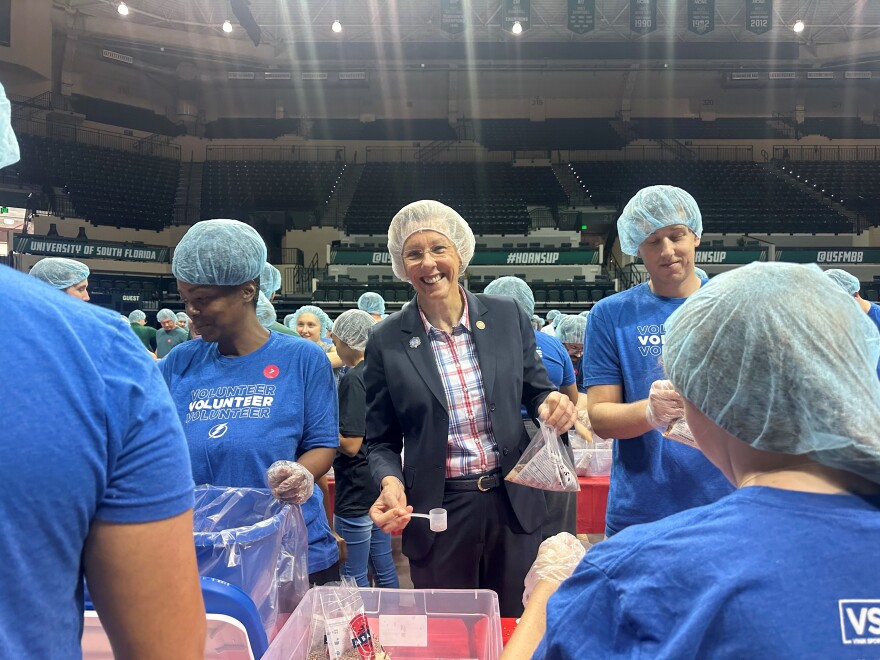On Sept. 11, some Americans are turning a day of tragedy into a day of service.
About 900 volunteers gathered at the Yuengling Center on the University of South Florida Tampa campus on Monday to pack about 270,000 meals for individuals and families in need.
The event was part of the "meal pack" program sponsored by the nonprofit 9/11 Day, which organizes large-scale volunteer events across the country each year in remembrance of the Sept. 11 attacks.
Across 18 different U.S. cities, more than 20,000 volunteers packed more than six million meals for people at risk of hunger.
Thomas Mantz is the president and CEO of Feeding Tampa Bay, which distributed the food locally.
"I think one of the things we all saw post 9/11 was how folks came together and said, 'Let's be responsible members of our community. Let's pitch in and help neighbors,'" Mantz said.
9/11 Day was founded in 2002 to "rekindle the spirit of unity, service and shared humanity that arose in the U.S. and spread around the world following 9/11," according to the organization's website. The nonprofit also led the efforts in 2009 to establish September 11 as a National Day of Service and Remembrance under federal law.
More than 25 Tampa Bay area corporations and their employees, including Macy's, Breakthru Beverage Group, Sunbelt Rentals, and Target, participated in the meal pack event on Monday.
Nationally, the 9/11 Day Meal Pack program is being supported by AmeriCorps, the federal agency for national service and volunteerism, Citi, United Airlines, JPMorgan Chase, Reliance Steel & Aluminum, and KPMG.
In addition to hunger relief, 9/11 Day is focused on education and provides lesson plans for teachers that teaches the history of 9/11 and the importance of civic engagement. The group is working on more pilot programs that give year-round support for hunger relief as well.
According to 2021 data from Feeding America, about 10.7% of the population in the 10-county region experienced food insecurity, which is defined as the lack of access, at times, to enough food for an active, healthy life.
Black and Hispanic communities experience food insecurity at higher rates due to "persistent racial gaps that are rooted in a history of structural and systemic racism."

Tampa Mayor Jane Castor, who attended the meal packing event on Monday, acknowledged the need to address hunger in the fast-growing metro region.
"Feeding Tampa Bay is addressing that day in and day out, trying to meet those needs of our community," said Castor, "And the needs are growing day by day, especially as prices go up, and more and more people move into our community."
A harrowing story of survival
Candiace Baker, an ambassador with 9/11 Day, was working as a New York City Police Department detective when the attack happened 22 years ago. Baker and her colleagues were watching the tragedy unfold from their building window, about seven blocks from the Twin Towers.
"I'm looking and I'm like, 'Oh, my God,' but still thinking it's an accident," said Baker, "And then the second plane came ... and we saw the back blow out of that building. I think I like lost a breath."
Baker and her colleagues scrambled to suit up and get outside.
"It was unbelievable, it looked like something literally out of a film. Cars were turned on their sides, glass was shattered out of storefronts," said Baker.

In the aftermath, she was assigned to missing persons, which involved digging through the debris transported from the Ground Zero site to the Freshkills Landfill on Staten Island. In those four months, she was exposed to toxic chemicals and became ill.
Today, Baker is a breast cancer survivor.
"Even as many people became ill, we'd run and do it again," she said. "Being part of this organization has shown that although that was one of the most horrific days, at least I know I've ever witnessed in my life, we can turn something horrible into something positive and into something good."




